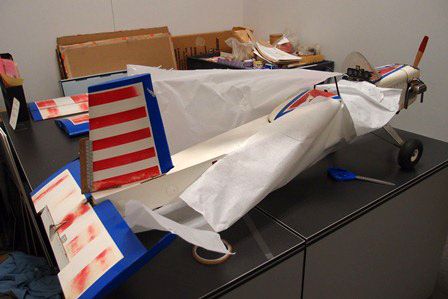Models airplanes are graceful in the air, but often can be clunky, bulky, and hard to handle on the ground. These characteristics make finding a method of storing a large number of them rather difficult, especially when preservation needs, something such as protecting them from light, dust, pests, and bad handling come into play.

At the National Model Aviation Museum, we’ve utilized our ceiling as a storage space, hanging models in custom–made bridles. Heavier, larger models find homes on shelves. The museum staff have handling procedures in place that guide how the models are hung and removed from their hooks to prevent handling damage, and acid-free tissue wrapping that keeps light, dust, and moisture at bay.

Here’s how we wrap our models for storage in our collection:

Gather your supplies and prep them in a place with lots of room to work. We use acid-free tissue, inert, double-sided tape, strips of plastic sheet, and a good pair of scissors. You might use clean, unbleached muslin, cotton twine, and a good pair of scissors.

Cut the wrapping material and wrap it around the largest section of the fuselage making sure to cut out areas for cockpits and other irregular pieces.

Make sure the wrapping is tight and covers each section of the fuselage equally.

We use strips of plastic sheeting closed with double-sided tape to hold the wrapping material in place. Tied cotton twine would
work just as well.

Third, cover the horizontal and vertical stabilizers, and any other uncovered pieces of the fuselage. Wrapping these areas can often be tricky because of their smaller sizes and unusual shapes. Folding the covering material to fit the shapes helps, as do patience and lots of straps holding the material in place.

Use smaller pieces to cover surfaces not reached by the bigger pieces of tissue.

Cover the wing sections the same way you covered the fuselage. It is important to wrap each section evenly and equally so there is no mismatched fading.

Once you’ve covered every part of the model, it is ready to place it storage.

Wing racks mounted on walls are a convenient, space-friendly method of storing models. Make sure the supports are close enough together to support the pieces, yet wide enough to protect against pressure damage.
Have questions? Get in touch with us at museum@modelaircraft.org!
